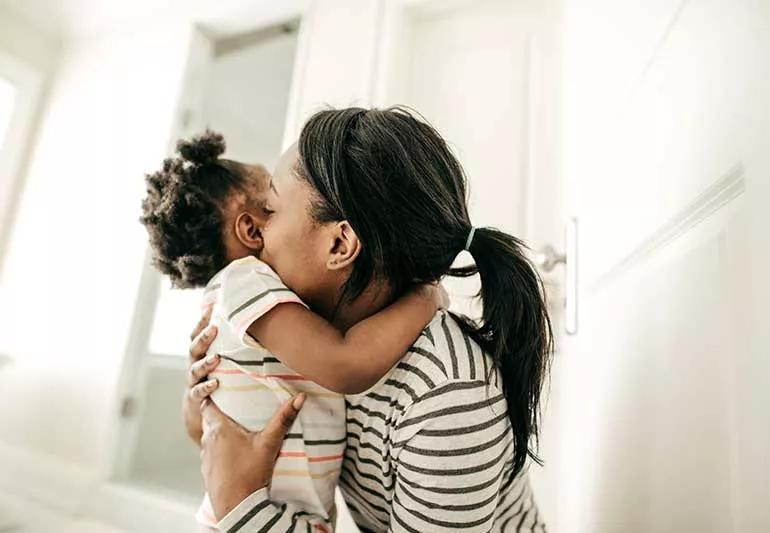Praise and nonfood prizes go a long way

Image content: This image is available to view online.
View image online (https://assets.clevelandclinic.org/transform/d297cc9e-b281-4703-a56a-79fe25d3283c/Potty-Training-929884102-770x533-1_jpg)
Mother hugging toddler.
It’s only natural. When you’re potty training your child, you might be willing to try anything (anyyyythinggggg) that will encourage your toddler to use the toilet.
Advertisement
Cleveland Clinic is a non-profit academic medical center. Advertising on our site helps support our mission. We do not endorse non-Cleveland Clinic products or services. Policy
For some of us, that means resorting to sweets and candy (read: bribery). Plenty of parents do it —chocolates, jelly beans or mini marshmallows in exchange for a successful trip to the bathroom.
The problem is that in the long term, using candy to reward potty training can get tricky. Those little sweets add up quickly, and too much sugar on the regular is no good for growing bodies and brains.
According to the American Heart Association, a child over age 2 should eat no more than 6 teaspoons or 25 grams of sugar a day — that’s really only about a cup of apple juice.
“Positive reinforcement in the form of sweet treats can be an effective part of toilet training,” acknowledges pediatrician Amy Sniderman, MD. “But you only want to use them for short periods of time. Using rewards like this should only last for a month at most.”
Dr. Sniderman says there are plenty of other ways you can incentivize your child to do their business that don’t require sugary “tinkle treats.” Here, she shares some favorite options.
Dr. Sniderman says toddlers thrive on positive reinforcement, so rewarding successful toilet use is developmentally appropriate for your little one.
Above all, keep it positive. Never shame or punish your child for failure, Dr. Sniderman says. If there’s an accident, simply let your child know they can try again next time, and that you appreciate their efforts.
Advertisement
Instead of offering candy, give your child plenty of verbal reinforcement. Say how proud and excited you are about their success. Give hugs, high-fives and remind them what a “big kid” they are for using the potty.
Very few toddlers can resist the allure of a sticker, and sticker charts can be a hit for potty training. Try giving your little one a sticker or a gold star on a chart for each time they use the potty.
“Stickers can be a good visual reminder of the great job they’re doing,” Dr. Sniderman says. “And at their age, they’ll likely respond just as well to stickers as they would to candy.”
Take it a step further and let your child know that once they have a certain number of stickers — say three or five — they’ll get a special reward, like a trip to the park or a small toy. Stick to just a few stickers for the first reward and gradually increase the number needed for a prize. This helps keep the momentum going and gives your child something to look forward to for their hard work. (Don’t we all need that sometimes?)
As an alternative to stickers, you can offer small prizes for successful pottying — think tokens, marbles and the like. (Just make sure to keep small stuff out of reach and out of your child’s mouth!) Give them a jar to keep their loot in, and consider a slightly larger reward when your child fills the jar with their little do-dads.
This one is perfect for future engineers and any kid who likes to track their progress visually. For each time they use the potty successfully, give them a building block. Watching their tower grow as they ditch the diapers can help your child see the success they’re making in a tangible way.
If you choose to give a food reward, stick to healthy alternatives. Whole-wheat pretzels, fruit, crackers, raisins or even nuts (if your child doesn’t have an allergy) are good alternatives. Be sure your child can safely chew what you offer without risk of choking — remember nuts and raisins are considered possible choking hazards in kids under 3.
Just as you must read your child’s interest and readiness for toilet training (typically between ages 2 and 3), you can also judge when your child is ready to give up the rewards.
There’s no set age or length of time for this process, Dr. Sniderman says.
She suggests keeping track of how long your child toilets appropriately. When you feel confident they’re comfortable with the concept, you can start to phase out the rewards.
And after some time of potty use success, you can up the ante. Tell your child they must use the toilet successfully two or three times to earn a reward. Over time, the reward will fade in its importance. And eventually, you can move on to providing the incentive only if your child asks for one.
Advertisement
“Pay attention to when your children become consistently successful with potty training,” Dr. Sniderman says. “That’s when you can start to phase out any rewards.”
Advertisement

Delivered every Tuesday!
Sign up for our Health Essentials emails for expert guidance on nutrition, fitness, sleep, skin care and more
Learn more about our editorial process.
Advertisement
Get to the source, offer encouragement and keep your cool
When your toddler won’t poop, here’s what you can do
And everything else you need to know to successfully potty train
Teething and frustration can make the ‘terrible 2s’ an unfortunate reality
Maturity and safety matter more than age
Toddler tantrums are normal, but sometimes, they need your help
Three tips for encouraging a healthy weight
How to help (and not shame) your child — while keeping your sanity
Type 2 diabetes isn’t inevitable with these dietary changes
Applying a hot or cold compress can help with pain
Pump up your iron intake with foods like tuna, tofu and turkey